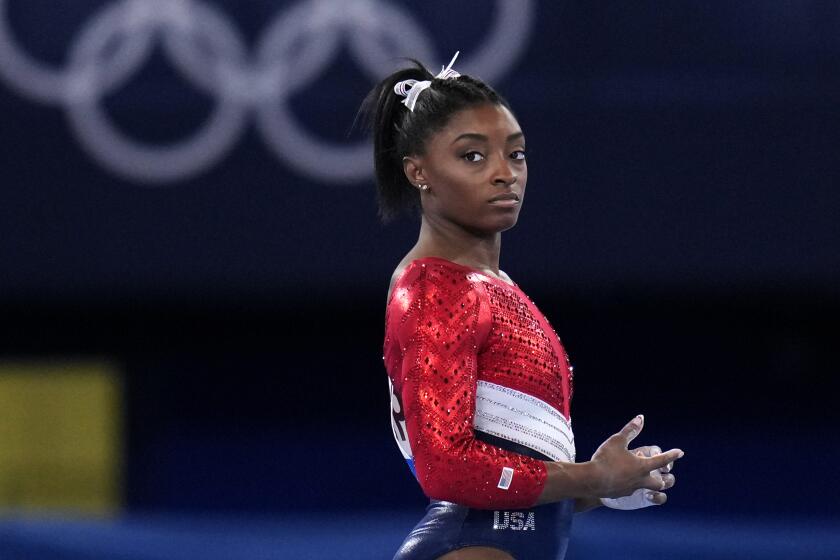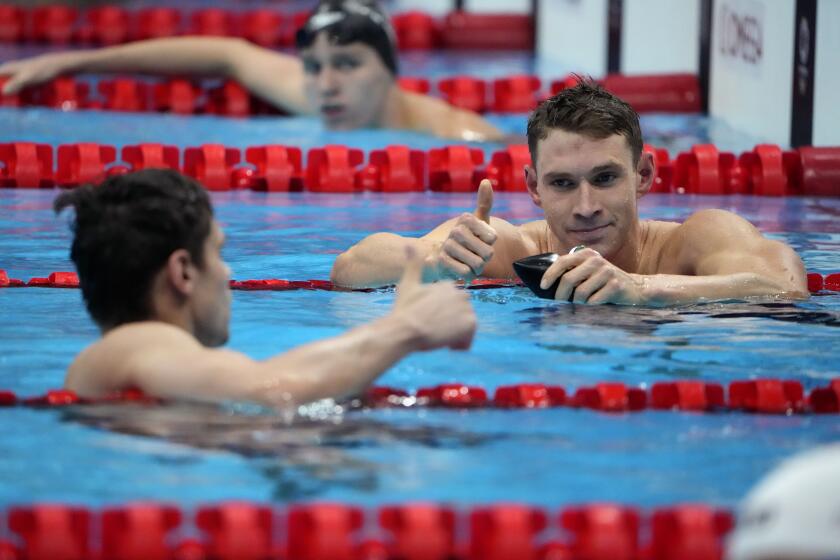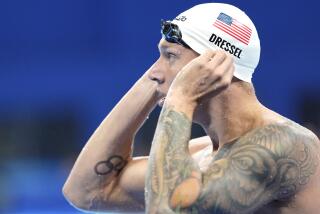Caeleb Dressel and Katie Ledecky put on pair of golden performances
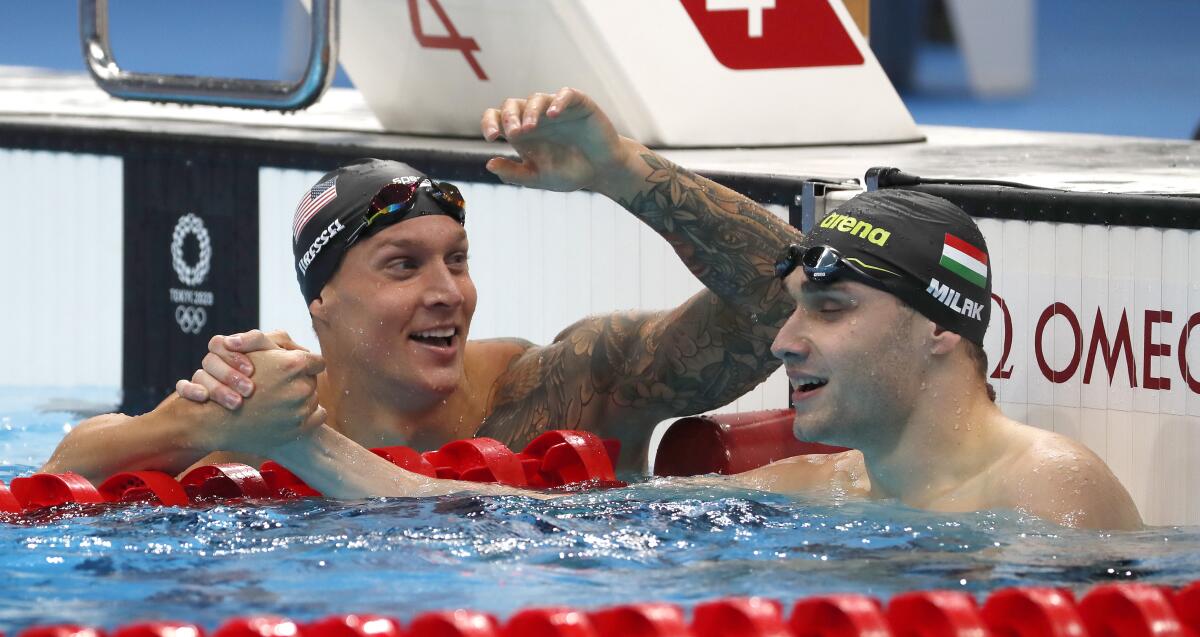
- Share via
TOKYO — Each gold medal at the Summer Games weighs a little over a pound, but the burden the discs made from recycled electronics carry can be much greater.
When two of the world’s most dominant swimmers, Caeleb Dressel and Katie Ledecky, grabbed hold of the starting blocks for their signature events Saturday, the expectation that rippled through the few hundred whistling, flag-waving athletes scattered around the Tokyo Aquatics Centre wasn’t just for them to win gold, but to deliver something special.
They provided that during a 25-minute stretch that made history.
Dressel broke his world record to win the 100-meter butterfly during a busy morning, then Ledecky followed minutes later with a victory in the 800 freestyle for the third consecutive Olympics.
Simone Biles, who withdrew from the team and all-around gymnastics finals, will not compete in two apparatus events at the Tokyo Olympics on Sunday.
“I’m just trying to soak in the moment,” Ledecky said at the end of a packed schedule in which she amassed two golds and two silvers. “I think I’ll just let this sit for a little bit.”
As Dressel tensed an instant before his start, what would happen seemed as obvious as the colorful tattoos of orange blossoms on his left elbow and the Olympic rings inked on his right forearm. During the 100 butterfly semifinals a day earlier, he set an Olympic record with the third-fastest time in history. It looked easy.
He did the same thing Saturday, leading after the first 50 meters and not letting up as Hungary’s Kristof Milak, who finished second, made a push in the final stretch.
Dressel finished in 49.45 seconds, shaving five-hundredths of a second off the record he set at the world championships in 2019 and bringing some electricity to a meet that hadn’t seen a world record set by a male swimmer. He admitted to pre-race nerves in the ready room.
“I get tired and I get nervous,” Dressel said. “Today was just a little bit different. … I was telling my brain to shut up, to be honest, because it was a little bit annoying. But that’s not going to hinder me executing my race plan.”
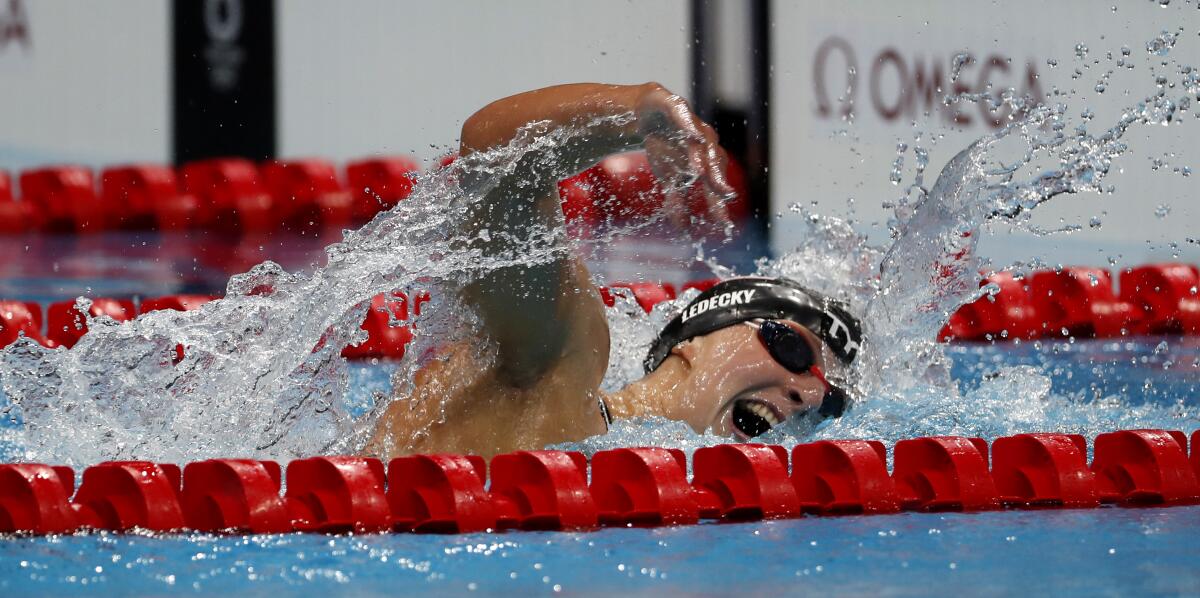
Fifteen minutes later, Ledecky took over.
Almost a decade ago, she burst onto the world stage with an unexpected win in the 800 freestyle at the London Olympics as a soft-spoken 15-year-old. Since then, she’s dominated the event like no other woman. The numbers almost don’t seem real. She entered the race with the top 24 times in history and 30 of the 31 fastest swims ever.
The distance between her and would-be competitors has been so great that anything short of another record, another cartoonish margin of victory each time she swims is greeted by murmurs wondering what’s wrong.
After an up-and-down week at the Games — Australian sensation Ariarne Titmus edged Ledecky in the 400 freestyle, then won the 200 freestyle while Ledecky faded to an uncharacteristic fifth, before the American rebounded with gold in the 1,500 freestyle — Ledecky gave a vintage performance.
U.S. swimmer Ryan Murphy’s comments about doping, which came after he lost to a Russian in the 200-meter backstroke, prompt ROC social media response.
Seventy-five meters into the 800 freestyle, the public address announcer trotted out familiar words: “As Ledecky starts to pull away …”
Titmus, better known for her work in shorter distances, hung within a couple seconds of Ledecky the entire race but never mounted a serious challenge to her lead. Ledecky touched the wall in 8:12.57 — her fastest swim in the event since 2019 — while Titmus was 1.26 seconds behind for second.
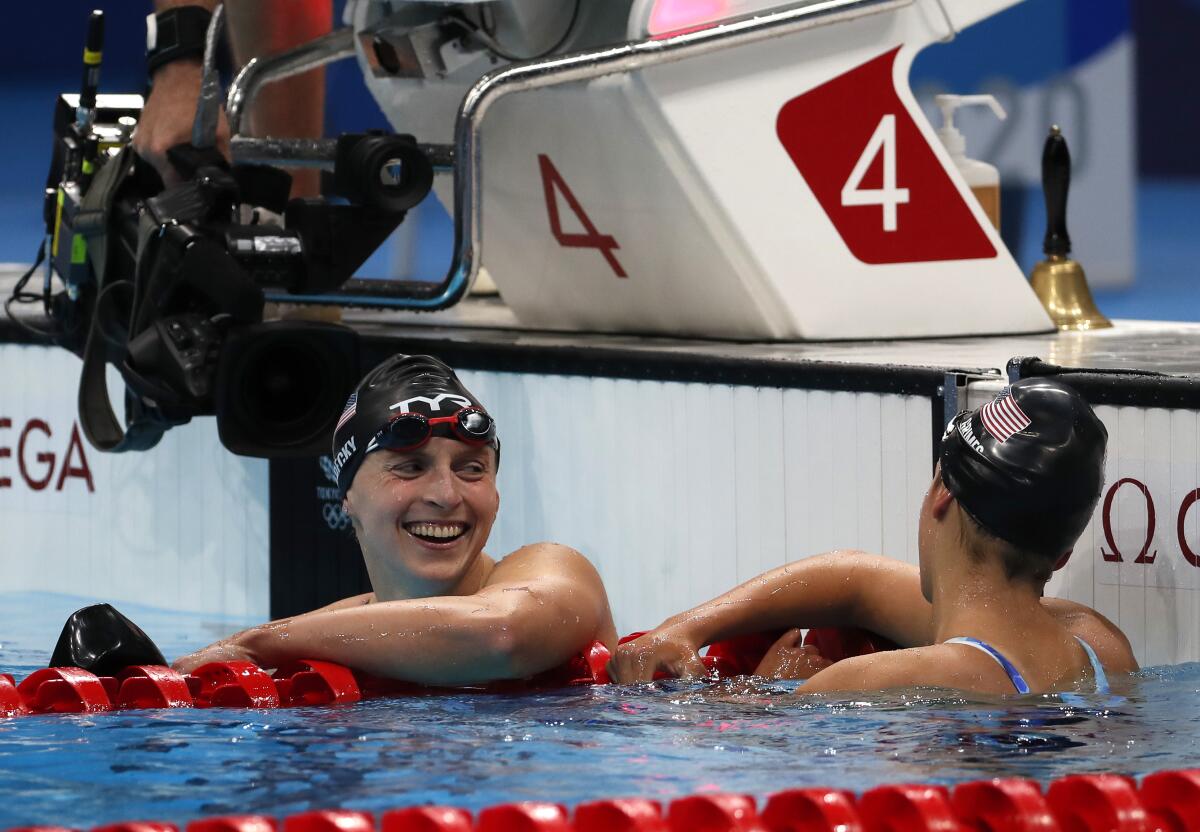
“It hurt,” Ledecky said. “There wasn’t a point in the race where I felt like I’m really going down or falling off the pace or anything, but afterwards it really hurt trying to get through the mixed zone.”
Titmus, 20, described Ledecky as being “in a class of her own” and said she was “over the moon” to even reach the podium, much less win silver, when racing her.
The win gave Ledecky six individual Olympic gold medals in her career, the most for any female swimmer. She plans to return for the Paris Games in 2024, joking with reporters that she’s not that old.
“I don’t know if even my first Olympic gold has sunk in nine years later,” she said.
Shortly after Ledecky’s win and the 100 butterfly medal ceremony, Dressel returned to the pool for the next leg of an unusual triple. He clocked the top semifinal time in the 50 freestyle — the final is on the last day of competition Sunday — then warmed down in the adjacent diving pool.
“Mentally it got a little easier as each race went on and I got in my groove,” Dressel said.
Twenty-four minutes passed before the mixed 400 medley relay started. The new event at the Games includes two men and two women on each team. By the time Dressel leaped into the water for the anchor leg, the U.S. was in seventh place. He was able to pull the team up to fifth, but the gap was too large to make up more distance.
The loss ended Dressel’s chance to win six medals at the Games.
But after collecting golds in the 400 freestyle relay and the 100 freestyle in addition to the 100 butterfly, Dressel still can add medals in the 50 freestyle and 400 medley relay Sunday.
If he captures the hotly contested 50 freestyle, he’ll become the first swimmer to win that along with the 100 freestyle and 100 butterfly in the same Games.
For Dressel, the opportunity to do something special isn’t over.
More to Read
Go beyond the scoreboard
Get the latest on L.A.'s teams in the daily Sports Report newsletter.
You may occasionally receive promotional content from the Los Angeles Times.
